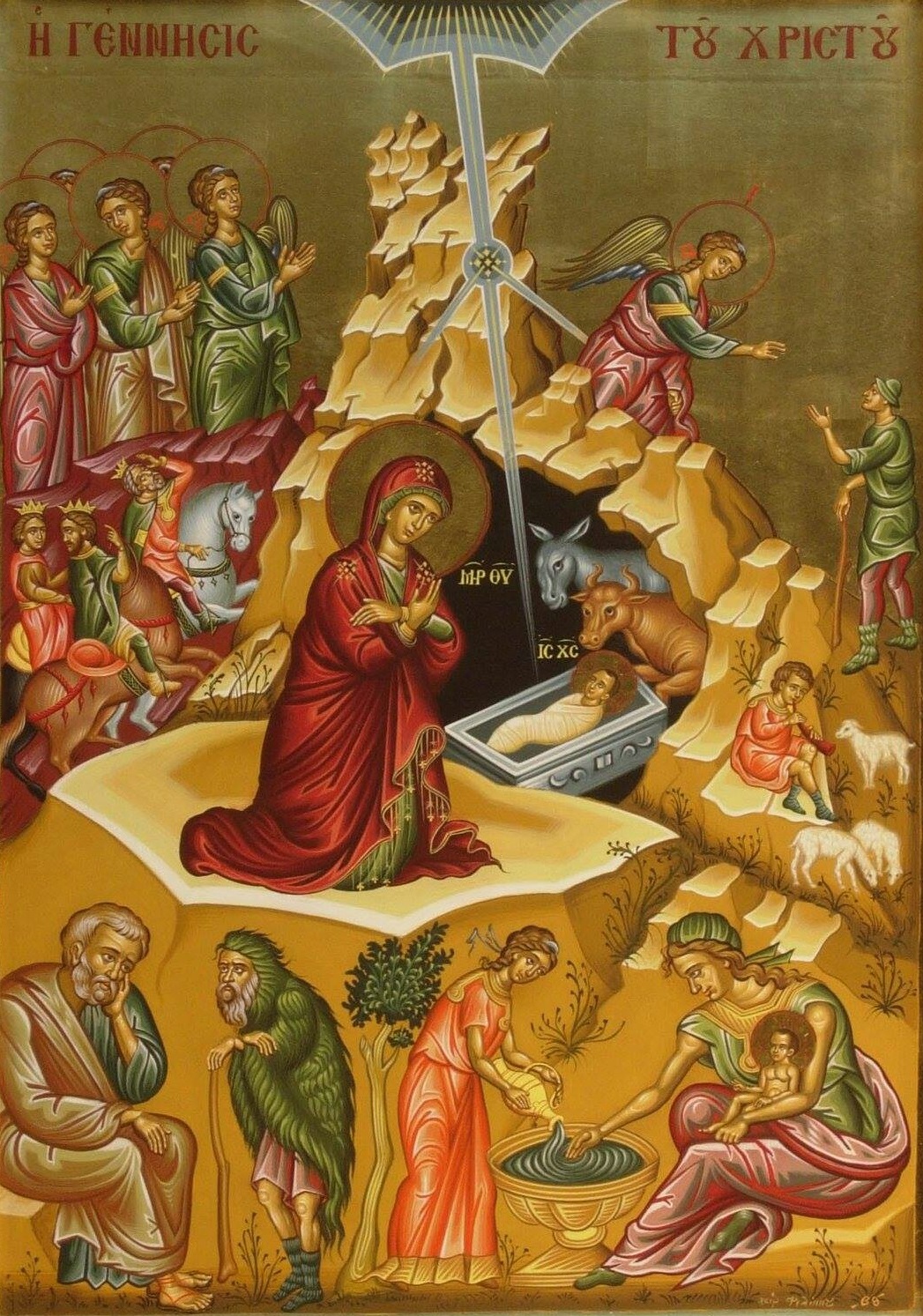
(View an explanation of the Nativity icon.)
By St Gregory of Nazianzus
Christ is born: glorify him. Christ comes down from heaven: go out to meet him. Christ descends to earth: let us be raised on high. Let all the world sing to the Lord: let the heavens rejoice and let the earth be glad, for his sake who was first in heaven and then on earth. Christ is here in the flesh: let us exult with fear and joy—with fear, because of our sins; with joy, because of the hope that he brings us.
Once more the darkness is dispersed; once more the light is created. Let the people that sat in the darkness of ignorance now look upon the light of knowledge. The things of old have passed away; behold, all things are made new. He who has no mother in heaven is now born without a father on earth. The laws of nature are overthrown, for the upper world must be filled with citizens. He who is without flesh becomes incarnate; the Word puts on a body; the invisible one is seen; the intangible one is touched; the timeless one makes a beginning; the Son of God becomes the Son of Man, Jesus Christ, the same yesterday, today and for ever.
It is the Word of God himself — who is before all worlds, the invisible, the incomprehensible, the bodiless, the beginning of the beginning, the light of light, the source of life and immortality, the image of the archetypal beauty, the immovable seal, the unchangeable Image, the definition and explanation of the Father. He came to his own Image, and took upon him flesh for the sake of our flesh, and mingled himself with an intelligent soul for my soul’s sake, purifying like by like; and in all points except sin was made man. He was conceived by the Virgin, who was purified beforehand in body and soul by the Holy Spirit, for it was needful both that childbearing should be honored, and that virginity should receive a higher honor. He came forth then as God with that which He had assumed, one person in two natures, flesh and spirit, the one deifying and the other deified. O new commingling! O strange conjunction! The self-existent comes into being, the uncreated is created, that which cannot be contained is contained, by the intervention of an intellectual soul, mediating between the divinity and the corporeity of the flesh. And he who gives riches becomes poor, for he shares the poverty of my flesh, that I may share in the richness of his Godhead. He that is full empties himself, for he empties himself of his glory for a short while, that I may have a share in his fullness
This is our festival, this is the feast we are celebrating today: the arrival of’ God among us, so that we might go to God—or more precisely, return to God. So that stripping off our old humanity we might put on the new; for as in Adam we were dead, so in Christ we become alive: we are born with him, and we rise again with him, [a miracle] not of creation but of re-creation.
Now then I pray you accept his conception, and leap for joy; if not like John from the womb, yet like David, because of the resting of the Ark. Revere the census record on account of which you have been written in heaven, and adore the birth by which you were loosed from the chains of your birth, and honor little Bethlehem, which has led you back to paradise; and venerate the manger through which you, who were without sense, were fed by the Word. Run after the star, and bear your gifts with the magi, gold and frankincense and myrrh, as to a king and a God, and to one who is dead for your sake. With shepherds glorify him, with angels join in chorus, and with archangels sing hymns. Let this festival be common to the powers in heaven and to the powers upon earth. For I am persuaded that the heavenly hosts join in our exultation and keep high festival with us today.

These selections are taken from Oration 38, a homily he delivered as Archbishop of Constantinople in the year 381.

About the Author
- Our father among the saints Gregory of Nazianzus the (Greek: Γρηγόριος ὁ Ναζιανζηνός] (329-390), also known as Gregory the Theologian and Gregory the Younger, was a great father and teacher of the Church. His feast day is celebrated on January 25 and that of the translation of his relics on January 19. With Sts. Basil the Great and John Chrysostom, he is numbered among the Three Holy Hierarchs, whose feast day is celebrated on January 30. St. Gregory is also known as one of the Cappadocian Fathers.
- January 3, 2018ArticlesOn the Baptism of Christ
- December 25, 2017ArticlesOn the Nativity of Christ